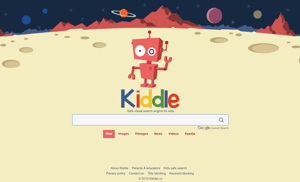Kiddle (search engine)
Kiddle.co is a web search engine and online encyclopedia emphasizing safety for young children. Kiddle is powered by Google Programmable Search Engine and employs SafeSearch, with additional filters. The user enters topics in the search toolbar, and Kiddle returns and ranks its findings, and pushes child-safe content higher in its search results.
 | |
 Kiddle's desktop home page | |
Type of site | Search engine |
|---|---|
| Available in | English |
| URL | www |
| Alexa rank | |
| Registration | No |
| Launched | 2014 |
History

Kiddle's domain was registered in 2014. The designers chose the .co domain name to emphasize that Kiddle is a quality "child-safe" search engine.[1] Kiddle became very popular in social media in 2016, and even became a meme due to blocking of certain words for a short period of time.[2]
Format
Kiddle uses an outer space stylized theme for their pages.[3] It appears like a Google Programmable Search Engine window. After the user enters the subject, Kiddle presents search results, with the first three results being deemed safe and written specifically for kids and "checked by Kiddle editors", the next four being safe sites not written specially for kids, but presented in kid friendly language. The eighth result and anything else beyond are safe sites written for adults but harder to understand for kids. Results presented are filtered through Google SafeSearch.[3][1]
If the user enters what are considered "bad words" a picture of a robot is displayed, telling the user to try again.[4]
Kpedia
Kiddle Encyclopedia (Kpedia) is an online encyclopedia, available from their search engine, powered by MediaWiki. It lists over 700,000 articles, and is "based on selected content and facts from Wikipedia, rewritten for children." Kiddle positions its Kpedia as an educational resource to be used for "school homework help and general education," and includes their articles in search results.[5][6]
Criticism
In 2016, Kiddle was criticized for blocking the keywords "gay," "lesbian," and the phrase "sex education," claiming that the keywords were not suitable for small children.[7][8] They had also banned the words "transgender", and "bisexual".[9] Due to public outcry, Kiddle announced they would unblock these words.[10]
Kiddle is powered by Google Custom Search but is not affiliated with Google LLC.[11] However, it has been mistaken for a Google product in several news articles and blogs due to its name[12].
See also
References
- "About Kiddle - visual search engine for kids". www.kiddle.co. Retrieved 2019-10-07.
- Connolly, Amanda (2016-03-01). "'Child-friendly' search engine Kiddle is promoting ignorance". The Next Web. Retrieved 2019-04-09.
- Keating, Lauren (2016-02-25). "Kiddle Search Engine Is The Google For Kids". Tech Times. Retrieved 2019-01-21.
- Kleinman, Zoe (1 March 2016). "'Safe' search engine blocks common words". Retrieved 23 January 2019 – via www.bbc.com.
- "Kids encyclopedia facts". kids.kiddle.co. Retrieved 23 January 2019.
- Navarro, Francis; Kom; o.com. "7 search sites to use other than Google". The Kim Komando Show. Retrieved 2019-01-21.
- Kleinman, Zoe (2016-03-01). "'Safe' search engine blocks common words". BBC News. Retrieved 2019-01-21.
- Connolly, Amanda (2016-03-01). "'Child-friendly' search engine Kiddle is promoting ignorance". The Next Web. Retrieved 2019-01-21.
- Griffin, Andrew (2016-02-29). "The 'child-friendly Google' bans swearwords like bisexual and transgender". The Independent. Retrieved 2019-01-21.
- "Kid-friendly search engine Kiddle unblocks 'inappropriate' words after backlash". pix11.com. 5 March 2016. Retrieved 23 January 2019.
- "About Kiddle - visual search engine for kids". www.kiddle.co. Retrieved 2019-10-07.
- "Child-friendly search engines: How safe is Kiddle?". Naked Security. 2019-03-19. Retrieved 2019-10-04.
Further reading
- Shields, Jane (Winter 2016). "Virtual Toolkit". Screen Education (Product Review) (82): 102–104.
- Ivers, Karen S. (2018). Using Technology to Support High-Impact Educational Practice. Libraries Unlimited. p. 131.
- Peachey, Nik (2016). Thinking Critically through Digital Media. PeacheyPublications Ltd. p. 160.
- Hertz, Mary Beth (2019). Digital and Media Literacy in the Age of the Internet: Practical Classroom Applications. Rowman & Littlefield. pp. 64, 205.